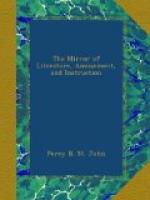I have seen many distinguished poets, Burns, Byron, Southey, Wordsworth, Campbell, Rogers, Wilson, Crabbe, and Coleridge; but, with the exception of Burns, Scott, for personal vigour, surpasses them all. Burns was, indeed, a powerful man, and Wilson is celebrated for feats of strength and agility; I think, however, the stalworth frame, the long nervous arms, and well-knit joints of Scott, are worthy of the best days of the Border, and would have gained him distinction at the foray which followed the feast of spurs. On one occasion he talked of his ancestry, Sir Thomas Lawrence, I think, was present. One of his forefathers, if my memory is just, sided with the Parliament in the Civil War, and the family estate suffered curtailment in consequence. To make amends, however, his son, resolving not to commit the error of his father, joined the Pretender, and with his brother was engaged in that unfortunate adventure which ended in a skirmish and captivity at Preston, in 1715. It was the fashion of those times for all persons of the rank of gentlemen to wear scarlet waistcoats—a ball had struck one of the brothers, and carried a part of this dress into his body; it was also the practice to strip the captives. Thus wounded, and nearly naked, having only a shirt on and an old sack about him, the ancestor of the great poet was sitting along with his brother and a hundred and fifty unfortunate gentlemen, in a granary at Preston. The wounded man fell sick, as the story goes, and vomited the scarlet which the ball had forced into the wound. “L——d, Wattie!” cried his brother, “if you have got a wardrobe in your wame, I wish you would bring me a pair of breeks, for I have meikle need of them.” The wound healed; I know not whether he was one of those fortunate men who mastered the guard at Newgate, and escaped to the continent.




